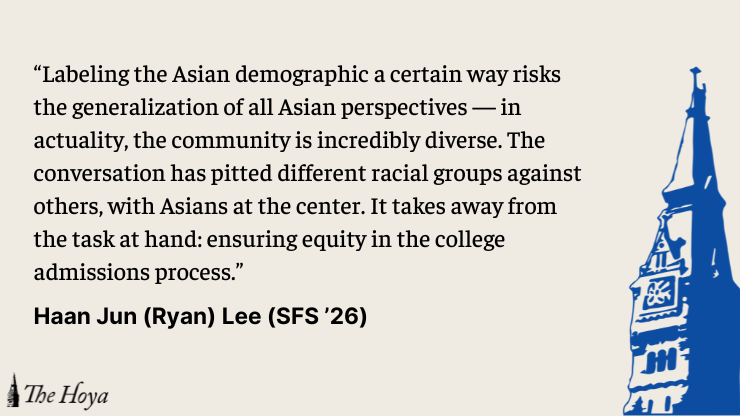Trending on Twitter: “Asians.”
As soon as I saw it, I knew it was about affirmative action. And as an Asian student who applied to college just a year and a half ago, I’ve got a lot to say.
On June 29, the Supreme Court ruled against affirmative action in college admissions in two lawsuits brought up by Students for Fair Admissions (SFFA) against Harvard University and the University of North Carolina.
I consider myself to hold liberal political values. And I know that systemic racism has scarred the U.S. for a long time, with remnants of slavery and segregation still affecting the lives of millions. There is a necessity to redress such grievances. For that reason, I understand why many would be angered at the Supreme Court’s decision on affirmative action.
But I’m here to share my story of applying to college and to explain how my cultural background impacted my experiences. Based on my admissions process, I understand why SFFA filed its lawsuits. My goal is not to spark drama or to criticize affirmative action supporters. Instead, I hope to share a perspective that readers find novel and informative.
I went to a majority-Asian international school in Jakarta, Indonesia, and college applications were a hot topic among my Asian classmates. The applicants had different profiles, aspirations and backgrounds, but many were united by one thing: their Asian ethnicity. And they were all worried about how that would impact the admissions process. It was not a pretty sight.
Even in my own application process, I had personal reservations at moments. As I received my college admission decisions, for example, my counselor told me that “it was a tough year for Asian applicants,” with his view reflecting the results of the students he mentored that year. He intended this as a compliment — that I had done well despite tougher admission circumstances for Asian students. Instead of accepting the compliment, his comments made me question: “What’s wrong with being Asian?”
Furthermore, when I was told by my counselor that mentioning Asian values in my Common App essay would be detrimental to my admission chances, I was taken aback. Initially, my essay idea was to discuss family values, specifically what the passing of a family member had taught me. But no, that was not good enough — it lacked details that made me stand out, according to my counselor said. As a result, I picked a different topic and started anew.
I am not the only Asian applicant who has felt this way. Numerous Asian applicants are pressured to appear “less Asian” in college admissions, out of concern that stereotypes relating to the Asian race would hinder their chances of admission. Consequently, in an effort to stand out and earn admission, Asians find themselves minimizing their cultural heritage.
SFFA’s lawsuit highlighted many of these concerns.
Their brief pointed out that Asian applicants consistently receive lower personal profile scores than other racial groups and had significantly lower acceptance rates, despite performing similarly in academics. Although the world of college admissions may remain secretive, the SFFA lawsuits have uncovered statistics showing why Asians have been so afraid to be Asian.
So as I look back at the issue of affirmative action, I can’t help but sympathize with the Asian students who filed the lawsuits. Affirmative action was a policy that hindered their chances of admission and inhibited their cultural expression; it was in their interest to challenge precedent.
Of course, not all Asians support the SCOTUS decision. Views on affirmative action in the Asian community significantly differ by country of origin, length of residence in the U.S. and a variety of other factors.
In terms of U.S. political discourse, some liberals have labeled Asians as “pawns” in the lawsuit. On the other side, conservatives have framed the lawsuit as a win for Asian applicants, a decision that would end discrimination against the group.
This pattern of language significantly endangers constructive discussion around affirmative action. Labeling the Asian demographic a certain way risks the generalization of all Asian perspectives — in actuality, the community is incredibly diverse. The conversation has pitted different racial groups against others, with Asians at the center. It takes away from the task at hand: ensuring equity in the college admissions process.
Following the decision, I urge my audience to rethink how they have discussed affirmative action over the past few months. Criticizing or generalizing one racial group does not support the cause of equal college admissions for all.
I still support ensuring a diverse student body on college campuses. Instead of race, colleges could focus on eliminating legacy admissions — a true hindrance to diversity. Some experts have suggested an admissions system based on socioeconomic class, which could be a better indicator of privilege and unequal opportunity. These options can and should be explored by Georgetown.
Instead, I hope that sharing my story has broadened the audience’s cultural awareness, helping them to understand why certain stakeholders have filed this suit against affirmative action. Amidst all the discourse following the decision, I can only hope that Asians don’t become another cultural target.
Haan Jun (Ryan) Lee is a sophomore in the School of Foreign Service.














